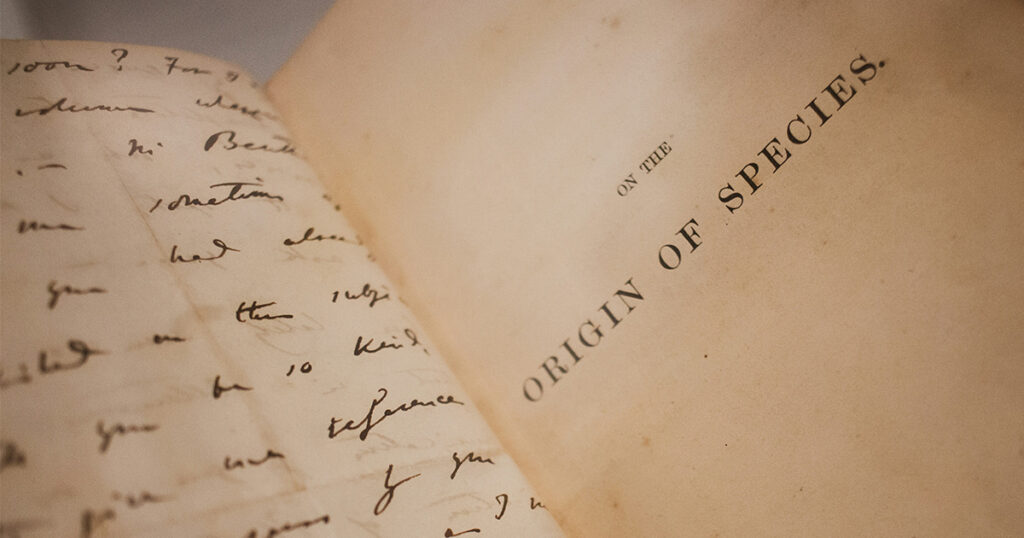
Purpose: What Evolution and Human Nature Imply About the Meaning of Our Existence by Samuel T. Wilkinson; Pegasus Books, 352 pp., $29.95
In December 1866, mathematician Mary Boole wrote to Charles Darwin:
Do you consider the holding of your Theory of Natural Selection, in its fullest & most unreserved sense, to be inconsistent,—I do not say with any particular scheme of Theological doctrine,—but with the following belief, viz: That knowledge is given to man by the direct Inspiration of the Spirit of God. That God is a personal and Infinitely good Being. That the effect of the action of the Spirit of God on the brain of man is especially a moral effect.
This was not an unusual concern at the time. Beginning with the publication of Darwin’s On the Origin of Species in 1859 and spurred on by the writings and lectures of English biologist Thomas H. Huxley in the early 1860s, many thinkers worried that Darwin’s world of mechanism, natural law, and evolution undermined not only the existence of free will but also the possibility that humans could lead meaningful and moral lives. Boole, however, stubbornly resisted these ideas. In her letter to Darwin, she continued: “Each individual man has, within certain limits, a power of choice as to how far he will yield to his hereditary animal impulses, and how far he will rather follow the guidance of the Spirit Who is educating him into a power of resisting those impulses in obedience to moral motives.” In other words, human beings are often confronted by mutually exclusive impulses, to be good or evil, to be altruistic or self-interested—a choice that seems to be written into our very nature and that we all must make. And in Boole’s view, the world that Darwin revealed was perfectly compatible with this requirement.
Boole’s letter is a nascent version of the ideas that Samuel Wilkinson puts forth in his new book, Purpose. A professor of psychiatry at Yale, Wilkinson brings Boole’s intuition up-to-date by drawing on the most recent findings of evolutionary biology and psychology to reveal what he calls “the dual potential of human nature.” Given that each of us has this dual potential—to make decisions between aggression and cooperation, for example—it would seem that our nature has set for us a certain test, a pointedly moral one. Thanks to our physiology and higher cognitive functions, we also have been imbued, for better and for worse, with the capacity to evaluate our performance on this test of life. Wilkinson, like so many 19th- and early-20th-century philosophers and scientists, is attempting to bridge the seeming gulf between reason and faith—and he does an admirable job, even if he sometimes seems unaware of the many other thinkers who came before him. But honestly, who cares if William James, or Jane Addams, or Josiah Royce said more or less the same thing? Wilkinson’s ideas may not be original, but he performs a service by making them more accessible to lay readers.
What he does not do is put forward, as did Darwin in a letter to Boole, the rather unsatisfying thesis that religion and morality and science “should each run its own course & that in the present case I am not responsible if their meeting point should still be far off.” In writing this, he seemed to ignore the question at the heart of Boole’s concern: to what extent does an investigation of biology and the human psyche reveal the possibility of purpose and meaning in a universe like ours? In her response to Darwin, Boole anticipates the thrust of Purpose: “My own impression has always been,—not only that your theory was quite compatible with the faith … —but that your books afforded me a clue which would guide me in applying that faith to the solution of certain complicated psychological problems which it was of practical importance to me … to solve. I felt that you had supplied one of the missing links,—not to say the missing link,—between the facts of Science & the promises of religion.”
Wilkinson deftly draws our attention to this missing link. In Purpose, he bids that readers consider what might be called an argument from experience: “What are some of the most meaningful moments of your life? For most of us, our answers are borne out by research. Psychologists have found that people tend to find sustained loving relationships to be among the most meaningful aspects of life. Yet there are moments when Wilkinson oversteps, especially in his assessment of the importance of marriage, which comes very close to teleology, and in his unsupported comment that “it’s difficult to believe that our most cherished relationships will cease to exist upon death.” This is slightly wishful thinking (I prefer to believe relationships are precious precisely because they are ultimately finite), but on the whole, Wilkinson’s description of our nature deserves a hearing: In order to inspire and protect meaningful relationships, human beings have to negotiate their “dual potentials” carefully. We don’t have to be perfect, but we do, on balance, have to make the right decisions day after day, year after year. Every world religion, every great spiritual or wisdom tradition, has this idea stitched into its moral fabric. If Wilkinson is right, it’s also part of our very flesh and blood.

